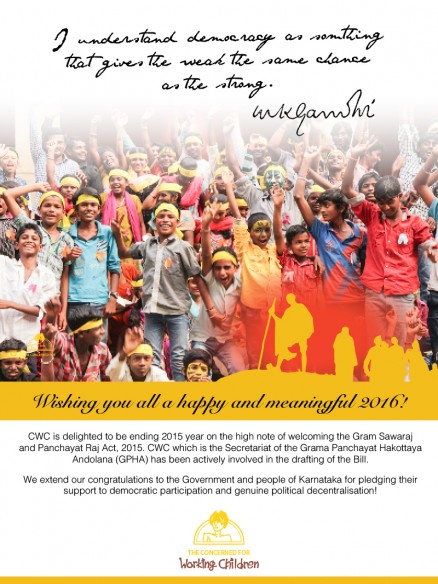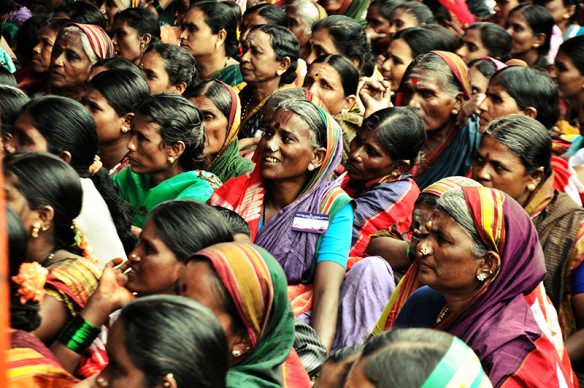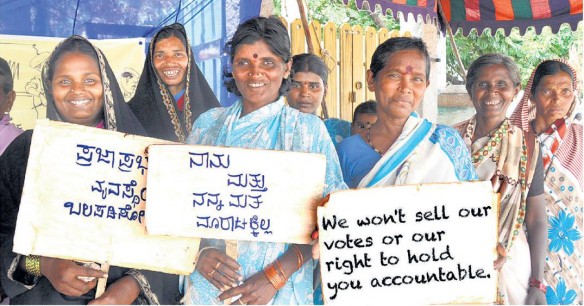CWC Newsletter – Issue 9 – December 2015
A Big Step Towards Political Decentralisation
By Nandana Reddy, Founder Director, CWC
With the tabling of the Karnataka Panchayat Raj [Second Amendment] Bill, 2015; enabling some of the much awaited Recommendations of the Ramesh Kumar Committee to become a reality, the Government of Karnataka has taken a huge step in the journey of devolution of powers to Panchayats.
The very fact that many of the recommendations of the Ramesh Kumar Committee have been accepted is a big step forward. That the Act will be renamed the Gram Swaraj and Panchayat Raj Act at least mirrors the spirit, towards the vision of the Mahatma and Rajiv Gandhi’s efforts to ensure that Panchayats are autonomous units of local self government.
Here are some of the salient amendments of the Committees that have been accepted. The recognition of Habitation Sabhas, giving voice to the truly marginalised such as Lambani tandas and thereby strengthening grassroots participatory democracy; the concept of the ‘Responsibility’ or Activity Map that details the roles, responsibilities and functions of each tier of panchayats ensuring that what the tier closest to the people [Gram Panchayats] get to hold the responsibilities that should be designed and implemented by the Gram Sabhas – such as the food provided in Anganwadis; plans developed by Gram Panchayats based on the needs of the members of the Gram Sabhas shall not to be altered and bottom-up planning with the proposed establishment of the Taluk Planning and Development Committees including representatives of Gram Sabha Presidents as members and also their inclusion in the District Planning Committees; and the setting up of a State Decentralised Planning and Development Committee.
The contentious issue of horse trading of the post of Adhyakshyas will be resolved with the term of Adhyakshya being made five years and the prevention of any no confidence for 30 months for trivial reasons. The Bill also ensures some level of accountability and transparency at all levels of the administration and will make it mandatory for members to declare assets and liabilities.
The proposed grievance redressal authority with a time bound and effective service delivery mechanism has been accepted. However the constitution of a Commissionerate of Panchayat Raj and Karnataka Panchayat Administrative Services on the lines of the KAS has been kept in abeyance due to financial constraints.
The need for the empowerment of women and the establishment of an environment conductive to their participation has been recognised and the reporting of sexual harassment in the vicinity of all Panchayats and acting to prevent and mitigate such offences. Creditably, the need for a ‘Fear Free’ environment and efforts to maintain Communal Harmony, respecting and protecting the rights and freedoms of minorities, the backward, women and children is much needed in the present clime of terror and divisive politics.
However to realise true Gram Swaraj some, the Bill needed to go all the way. It falls short of being the ‘game changer’ that our Chairperson and members of the Committee desired it to be. The autonomy of panchayats as recommended has been diluted across the board. This has been done quite subtly with the replacement of words. For example ‘implement’ has been replaced with ‘supervise’ and one word inclusions such as ‘the priorities set by Gram Sabhas normally shall not be changed’, ‘Adhyaksha may call for special meetings of Grama Sabha’ have been made that change the mandatory nature of the power.
Recommendations that have been dropped are the single member constituency; the primary role of the Ward Sabha – that of ensuring the accountability of the elected member and giving the right to recommend to the Election Commission the cancellation of member ship if the said representative fails in her/his duties. Ironically, the Bill suggests instead that Government shall have the power to remove members if it thinks fit on the grounds of misconduct, insolvency, corruption or nepotism.
Only 20% of untied funds have been provided for as against the 50% suggested by the Committee, but is a considerable improvement as now there is no such provision.
However, the recommendations on general powers of Gram Panchayats related to land reforms, audit and Jama bandi have not been considered. Other amendments dropped are the mandatory holding of Special Gram Sabhas for women, children and backward classes where plans and budgets would have been decided. The role of Habitation/Ward and Gram Sabhas to address children’s rights violations such as exploitative child labour, child marriages, child trafficking has also been dropped. In addition, their role to decide the location where Gram Panchayats may grant licence to shops vending liquor or places of gambling has also been left out.
The Capacity Building of Panchayat Presidents and members, the mechanism for grievance redressal has been provided for only at the District level and the structures for the solving of petty dispute have been dropped. So also the provision of emergency budgets for Gram Panchayats and Taluk Panchayats; and the provision of a Private Secretary for Adhyakshyas and the separate toilets for women.
Granting the rank of Minister of State to Zilla Presidents with attended emoluments, but ignoring that fact that the presidents of all three tiers of panchayats are the Chief Executives of their respective panchayats and that they are all equal and should be given equal status and commensurate provision, is going to create an un-democratic hierarchy that reinforces a vertical top down power structure that is in contravention to the principles of devolution.
The saga of realising this Bill has been long and arduous, littered with obstacles mainly from the bureaucracy unwilling to relinquish finance, powers and control to local governments. Fortunately, the extraction of a commitment from our Chief Minister by Shri Rahul Gandhi on his last visit to Karnataka appears to have hastened things along and given our Rural Development and Panchayat Raj Minister, Shri H K Patil, the much needed muscle he required to get the Bill passed by the Cabinet.
One hopes that there will be an informed and in-depth debate in the Assembly in the coming week that will result in tightening the loopholes and filling the lacuna and that the final Bill will be what our RDPR Minister claims to be a “historic” one.
Impact of Gram Panchayat Hakkottaya Andolana’s activities on passage of the Gram Swaraj and Panchayat Raj Act, 2015
Background:
Grama Panchayat Hakkottaya Andolana (GPHA) was launched in 2007 to counter an amendment to the Karnataka Panchayat Raj Act passed in both the legislative houses of Karnataka. This amendment was one of the many moves designed to whittle away powers from individual citizens, weakening the very foundation of democracy. It blatantly denied the right of the Gram Sabhas and Gram Panchayats to identify beneficiaries for Government Programmes and transferred this right on to “any Committee or authority of the Government constituted in this behalf.”
After successfully blocking this amendment with the help of the Honourable Governor of Karnataka who returned the Amendment that was sent to him for approval with a strongly worded note, the GPHA decided to take the movement forward in order to strengthen the capacity and powers of Panchayat Raj Institutions to function more effectively to empower the members of Gram Sabhas to participate in determining their future in the development of their villages and to ensure that governments and civil society enable the realization of the 73rd Constitutional Amendment and respect the legitimate rights and responsibilities of Gram Panchayats in letter and spirit.
From its inception, Andolana observed that many stumbling blocks to the smooth functioning of Gram Panchayats as self governing institutions as envisioned under the Constitution and the State statute persist. Lack of clarity regarding the roles and responsibilities between the various levels of governments and for the members of the Gram Panchayat curtailments, withdrawals and interference had become routine.
At this crucial juncture Andolana decided to hold a State Level Convention so that the members of the Gram Panchayat could discuss their grievances with the aim to find solutions and obtain from the state government a commitment to the spirit of grass-root democracy, effective decentralisation and initiate actions towards removing all legal as well as administrative hurdles. Andolana thought that this would create an opportunity for the members of the Grama Sabha and the Grama Panchayats to access information required for capacity building. Hence, ‘Grama Swaraj Samavesha – 2011’ was organised and it was the second time that the Grama Panchayat Hakkottaya Andolana witnessed such a tremendous response in terms of actual numbers and participation of Grama Panchayat members. ‘Udupi resolutions -2011’ was declared to pave the way for a new chapter in governance free of corruption and vested interests dedicated to the development of villages. This was a major breakthrough for Andolana at state level. From then on ward, all the activities of Andolana gained recognition from the various strata’s of Government.
Involvement in Act Amendment process
The Gram Panchayat Hakkotaya Andolana (GPHA) had repeatedly seen the usurping of powers of the local governments by the bureaucracy which curtails the local governments in a grave manner. This has been the reason for frequent conflicts between the elected member of the gram panchayats and the Panchayat Development Officers. This also hampered the harmonized functioning of the Village, Taluk and Zilla panchayats – the results of which have far reaching impact at the State as well as the National levels.
In this context, the Karnataka Panchayat Raj Act Amendment Committee was set up by Karnataka Government to suggest remedies to the existing Act that has been mangled through hundreds of executive orders by myopic Ministers and bureaucrats, to a mere State controlled delivery system manned by officials rendering people powerless. Over a period of time all schemes have been centralised, the bureaucracy strengthened and all the rights, powers and autonomy of the Panchayats and Gram Sabhas systematically taken away.
As a result of the history of Andolana and through the continuous discussion held with state government and RDPR Minister, GPHA garnered the opportunity to be part of Panchayat Raj Act Amendment committee, Ms. Nandana Reddy, Founder Director, CWC and presently Convener of Andolana and Mr. T.B. Shetty Andolana Member became members. This opportunity was granted taking into account all work done by Andolana since 2007; specifically the Udupi Declaration 2011 through Gram Swaraj Samavesha (A convention of Panchayat Members) held in 2011 and the activities followed by it. Ms. Nandana Reddy was later also chosen to be a Core Committee member.
In the course of a year Andolana was able to manoeuvre the process to become more bold and participative. It was successful in setting the tone for the review by submitting its perspective through a document which later became the ‘Intent and Objectives’ for the entire process. Extensive consultations with various stakeholders – general public, elected representatives, political parties, bureaucrats, etc. – were held. CWC along with the Andolana team worked rigorously to prepare the Committee Report of Recommendations and on drafting the proposed act amendment along with its schedules and responsibility map of three tiers of Panchayat Raj System. In November 2014, the Committee came out with a report entitled ‘Path to Grama Swaraj’ which suggested extensive shifts to radically decentralise governance and allow for greater citizen self-determination. This was presented to the Chief Minister for consideration to be passed as the new law for the State.
It was a path-breaking report which amongst many progressive recommendations, paid special attention to ensuring that:
– Panchayat Raj Institutions (PRIs) act as autonomous governments;
– A realignment of governance structures takes place in order to respond to the needs of the Gram Sabhas;
– Promote the concept of people centric participatory democratic planning;
– Incorporates the rights of individuals and sets up systems to realize the rights of those belonging to marginalized sections; particularly, for children and women by stressing on the mandatory setting up of women and children’s gram Sabhas.
– Laudable recommendations were made that support building political leadership capacity in women.
It was known that if the law is passed based on the submitted Recommendations, it would be the most progressive law on decentralisation in India. Therefore, Advocacy work throughout the state began using different mediums and strategies to create awareness on the core values of report and its recommendations. More than 15 articles have been written and published in several well known news papers as a part of dissemination of information on the recommendations and proposed amendments. Signature campaigns; dissemination of information through social media and websites; lobbying with MLAs; MLCs; Key political Party leaders and National level political party leaders was also the part of the advocacy strategy to urge the government to accept and implement the recommendations. The GPHA representatives met with more than 110 members of Legislative Assembly and Members of the Karnataka Legislative Councils to lobby with them and hand over briefing material.
As a result, Karnataka Gram Swaraj and Panchayat Raj (second Amendment) Act, 2015 was signed by the Governor of Karnataka after it has been passed by both houses of the Karnataka Legislature on the 26th and 27th November 2015 followed. It has been a delight to see that nearly 90% of the far reaching amendments suggested by the Committee have been accepted. Probably for the first time in the history of Panchayat Raj in India, the devolution of the 3Fs [finance, functionaries and functions] to Panchayats has been ensured to such a great extent, bringing the fulfilment of the 73rd Constitutional Amendment closer to reality. The passage of this Bill by both the houses and the Governor’s assent are a huge footprint in the history of Panchayat in India!
Press Release
Grama Panchayat Hakkottaya Andolana, Karnataka
Date: 19 December, 2015
Andolana welcomes the Gram Swaraj and Panchayat Raj Act, 2015
The Gram Swaraj and Panchayat Raj Bill (Second Amendment), 2015 has been signed by the Governor of Karnataka. The Government, through the passing of this Bill, has demonstrated its commitment towards establishing Gram Swaraj in the state of Karnataka. The Grama Panchayat Hakkottaya Andolana (GPHA) believes that the Government has pledged its support to democratic participation and genuine political decentralization through ensuring the participation of women, children, marginalized and vulnerable groups through this Act. GPHA extends its heartiest congratulations to the Government and people of Karnataka for making this is a reality.
The Government of Karnataka constituted the Ramesh Kumar Committee to amend the Karnataka Panchayat Raj Act. The members of the committee, including Smt Nandana Reddy, convenor of GPHA were involved in the drafting of the report and recommendations with a vision to enable participatory democracy and political decentralisation. The Committee brought out a landmark report that has been hailed as a model to the entire nation. We congratulate and thank the members of the committee for their landmark contribution.
This is indeed a milestone for the advocacy by the Grama Panchayat Hakkottaya Andolana. Andolana has been working in partnership with gram panchayats and the members of the gram sabhas with the strong commitment to realize Gram Swaraj through strengthening democratic participation and political decentralization in the state of Karnataka since the year 2007. In December 2011, Andolana held its first Grama Swaraj Samavesha, a state-wide convention with delegates representing Panchayats held in Udupi district, Karnataka. The convention saw over 5000 delegates gather to deliberate upon the future of participatory democracy in Karnataka. The Udupi Resolution that was presented before the audience, created a huge impact on the thinking about Panchayati Raj. The Udupi Resolutions formed the basis of the Andolana’s inputs to the Gram Swaraj and Panchayat Raj Act, 2015. As a result of its historic engagement and struggle to strengthen Panchayat Raj in the state of Karnataka, the convenor of Andolana, Ms. Nandana Reddy was a member of the Karnataka Panchayat Raj Act Amendment Committee formed by the State of Karnataka thereby extending a significant contribution.
This Act is a successful step to strengthen Gram Swaraj. It gives more power to the gram panchayats of Karnataka than ever before to act as autonomous, self-sustained governments. To implement the spirit of the Act, the members of the panchayat have a significant role. Their commitment to decentralisation, participatory democracy and adherence to the principles of the Constitution will make the Act come alive. In order to implement the Act, Andolana urges the Government to sustain this concern and commitment.
In line with the Constitution of India, this Act is a victory for the advocates for self-sustained local governments. Only when the foundation of local governments are strong and when they remain accountable to gram sabhas will the primary objective of the Act be realised. Andolana places its trust on the representatives of the three tier Panchayat system and hope that they understand the core principles of the Act and work towards a corruption-free, secular society as representatives of a democratic socialist country, work towards creating a safe environment and they involve themselves in working towards the formation of people-friendly villages. These will also have a positive influence on the State Government of Karnataka. Lastly, with this Act, may Karnataka set a true role model for political decentralisation for the entire nation!
Read the Kannada version of the Press Release here.
Links to Press Coverage
Times of India: http://timesofindia.indiatimes.com/city/bengaluru/New-law-soon-to-sack-elected-panchayat-members-in-Karnataka/articleshow/49834977.cms
Deccan Herald: http://www.deccanherald.com/content/518736/state-govt-congratulated-gram-swaraj.html
Deccan Herald: http://www.deccanherald.com/content/512712/bill-give-more-muscle-panchayat.html
Relevant News
Justice that is rehabilitative
Exclusion from poll process through edu
Panchayats must not be elitist





